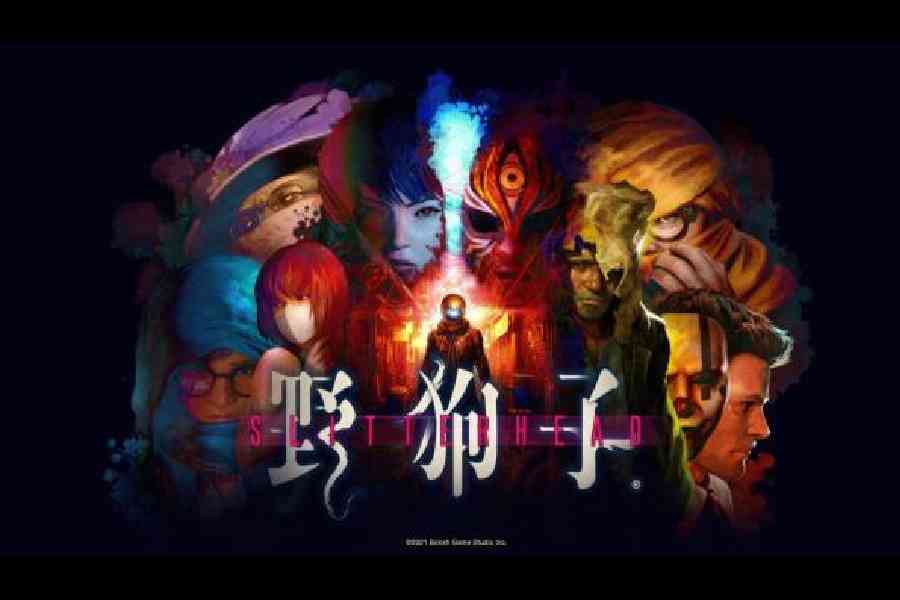Keiichiro Toyama, the creator of the revered Silent Hill series, has produced a bloody, gruesome, sometimes indecipherable tale set within a seedy 1990s-era Kowlong, a fictional city based on a district of Hong Kong. In the game, the slum nights are long, denizens heave into trash cans and neon signs advertise massages.
The game’s opening contains moments that are among the grossest I have watched this year. Flies buzz near a trash container into which a human body has been stuffed. There’s a hole where a man’s right eye should be. An investigator shines a flashlight there and the camera travels deep into the ocular remains, exposing yellow-brownish matter. Repulsive as it is, this particular moment is an example of horror as an art form. After the shock abates, a question remains. Who or what made this hole in someone’s head?
To help players unravel Slitterhead’s mysteries, a key gameplay mechanic is quickly revealed. Slitterhead is all about possession. As you begin, you’re the unseen flying Spirit. With the flourish of a rotating ring of fire, you possess a dog right though its barking mouth. The short-haired mutt, now with glowing red eyes, allows you to move furtively through the city’s dirty alleyways.
I listened in on T-shirted men talking about killings. People’s brains have been sucked out by Slitterheads. “Bad for business,” complained one.
With enthusiasm, I possessed people hundreds of times during this 15-hour escapade. If a fence barred the way, I could focus on a human beyond it and invade his or her body. Slitterheads, who are disguised as people and can’t be possessed, aren’t zombies. Rather, they turn into hideous creatures that sometimes reminded me of the Bloater from The Last of Us Part II.
Instead of being fungus-ridden like the infected in that game, these monsters might have globules of guts on their heads. In an odd but effective design choice, one looked like its head was growing green bananas. Others are ugly mantises with octopus tentacles, or skeletons that have mutated to outsize proportions and from which flesh-coloured, brain sucking probes appear. They scream like angry elephants.
The Spirit partners with Julee, a short-haired young woman who can change into Leopard Head, a masked human being with long talons like Wolverine’s, except they’re blood red and as long as a femur. She’s called a Rarity, one of eight more powerful human beings that you encounter. As Julee duels it out with the Slitterheads, she slashes, parries and invades the bodies of nearby humans when her health is low. The monsters, of course, become somewhat more agile and difficult to annihilate as the strange plot unfolds.
As characters, the Spirit and Julee could benefit from more effective dialogue. But they’re both properly bizarre, more so than the others who appear, like a rich older woman with a cane and an unhoused man with a bottle in his hand. They are cliché and one-dimensional.
Midway through, Slitterhead becomes more of a darkly heroic adventure, with the creepiness that scared me early on tempered by a sense that the eccentrics here are just warring immortals. After grasping this disappointing revelation, exploring the somewhat-repetitive slum environments is what beckoned. The gritty back streets and brothels of Kowlong’s Mong Tsui district are enhanced by Akira Yamaoka’s taut soundtrack. At its best, the music is tense and droning, the chords distressing and dissonant.
Yet Slitterhead has annoying gameplay issues. While trying to jump over a chain-link fence to ascend a building, Julee fell behind some huge bags of rubbish. I couldn’t get her out. The possession feature was impossible to use because I couldn’t see a human beyond the detritus. It was necessary to restart at a previous checkpoint.
Then, when I was stuck in a corner, the camera wasn’t precise. I couldn’t see directly ahead because a girder or plant would block my vision.
The end here is not the end, not really. After some gameplay loops, a sequel is set up with one sentence of text. After so much tracking, chasing and battling, I felt resentful. Marketing a potential Part 2 made a somewhat satisfying, vague conclusion into something of a money grab.
NYTNS











